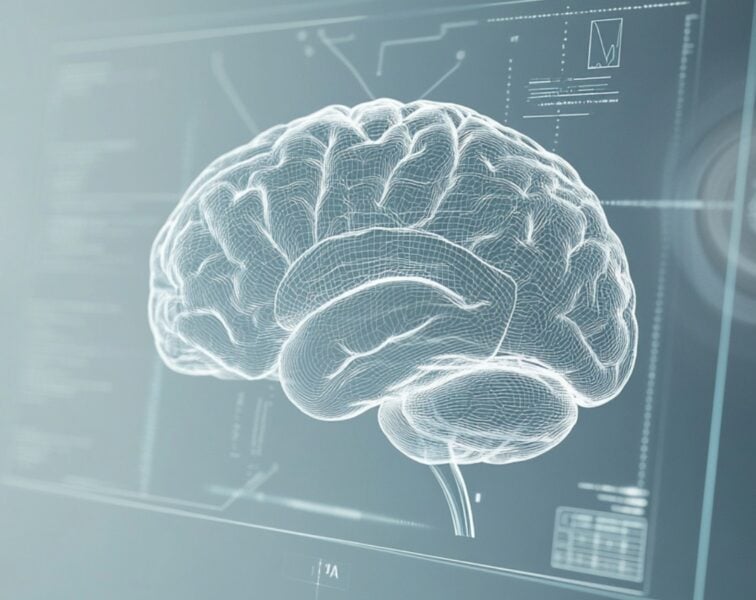On January 11, 2012, an article was published in the NY Times Health blog section titled, “Exercise hormone may fight obesity and diabetes.” The article reports on a recently published study in the journal Nature, the abstract of which can be found here.
The authors present research linking a hormone secreted during exercise to the conversion of white fat (white adipose tissue, WAT) to brown fat (brown adipose tissue, BAT). This is interesting from a scientific perspective because human adults have very little BAT. By comparison, newborns have modest amounts of BAT — about 5% of body mass, which can protect them from hypothermia, as you’ll see below. These two types of fat derive their names from how they look under a microscope. WAT cells look like what you’d think a “fat cell” would look like — a single droplet of fat in a cell and not much else. By contrast, BAT cells look darker. Upon further inspection, it seems their darker color results from the presence of mitochondria, the so-called engine of the cell, and other cellular components. Without getting into a lot of detail, a number of investigators believe that BAT is actually closer, embryologically, to muscle than it is to WAT.
Whenever I give talks to swimmers, in particular, I get asked about BAT because the advantage of BAT (over WAT) is that one of its jobs appears to be thermogenesis (heat production). This is of paramount importance for a hibernating animal and could come in handy in a newborn baby. It’s also highly desirable, say, for someone trying to swim across the frigid English Channel while staying reasonably warm. As a result of this thermogenic property of BAT, it’s possible that the more you have the more energy you’d expend. Hence the reason this paper is so interesting and the reason the NY Times is writing about it.
There are two main points I want to make about this article. I’m not at all “picking on” either the NY Times article or the scientists who did the research. I think this research is fascinating and well conducted. But, I do want to give you a few things to think about while you get constantly bombarded by articles like this, which appear to be coming at us at an ever increasing frequency. I think I get about 4 or 5 such articles every week, though there is probably a selection bias somewhere in there, given my interests.
My first point has to do with the concept of relative importance. To have this discussion I think it’s important to understand the difference between a “first-order term” and, say, a “tenth-order term.” Anyone who spends enough time with me (e.g., my poor wife) will attest that I always speak about this distinction. Let me illustrate with an example. If someone is on a sinking ship in the middle of the ocean, the first-order term (or requirement) is finding a lifeboat with oars. The second-order term is securing an adequate supply of fresh drinking water. The third-order term is having sufficient food to eat. The fourth-order term might be finding a map of nearby islands. And so on. The tenth-order term, by extension, is having a high quality pair of polarized sunglasses. I am not suggesting that being on the ocean for days without good sunglasses would be pleasant — it would be miserable — but it’s nowhere near as important as having a boat, water, and food.
It’s become very popular to discuss what I refer to as “tenth-order terms” while ignoring “first-order terms” whenever we talk about obesity research. I believe this is because the research community (and the journalists who cover it) want to believe that the answer to this overwhelming problem is so complex, which explains nicely why it hasn’t been cracked yet. How else can the solution be eluding the medical establishment? We tend to fixate on peptide YY, ghrelin, leptin, and now irisin. I am not saying these hormones don’t matter, but when we focus on them — at the exclusion of the obvious hormone (insulin) that actually regulates fat accumulation — it’s a real tragedy for the 200 million Americans who are overweight. Remember, obesity is not a disorder of over-eating or under-moving. It’s a disorder of fat accumulation. These are not the same thing at all.
People are frustrated with how difficult it is to lose weight, and rightfully so. I know I was. Even this article acknowledges the disconnect between doing what we’re told and reality — “Why, for instance, if exercise increases levels of irisin and irisin increases the body’s stores of energy-burning brown fat, does exercise so rarely produce significant weight loss?”
This point has been acknowledged for some time now, too. The American College of Sports Medicine and the American Heart Association in their physical activity guidelines (2007) made this statement: “It is reasonable to assume that persons with relatively high daily energy expenditures would be less likely to gain weight over time, compared with those who have low energy expenditures. So far, data to support this hypothesis are not particularly compelling.” (And one of the co-authors of this ACSM/AHA report is an exercise physiologist who described himself as “short, fat and bald” when he started running 30 years ago, and since then has run 85,000 miles, or the equivalent of more than three times around the globe at the Equator, while only becoming “short, fatter and balder,” in his own words.)
I know it’s tempting, when we read reports like this, to hope for a magic drug – synthetic irisin – that we can inject into ourselves one day to help us burn more fat. But the good news is you don’t need synthetic irisin. Or synthetic leptin. Or some other magic drug. You don’t even need to exercise to lose weight (or fat, more specifically), if you don’t want to (though I think there are at least 5 excellent non-weight-related reasons to do so). You just need to stop eating the foods that increase insulin levels in your body and retrain your body to burn fat instead of storing it.
Fifty years ago we had a fraction of the obesity and obesity-related diseases we face today. Was it because we exercised more? Hard to believe this, given the best available evidence of exercise’s impact on weight. We certainly didn’t have synthetic irisin or leptin to inject into ourselves. The reason our society has become more obese and more chronically ill than ever before is because of what we eat. It seems we should spend more time and energy reversing that (obvious) problem, rather than searching for a magic drug.
My second point is not just a comment on this work but more of a broad comment on much of the obesity-related research being done — it’s often done in mice. Renato Baserga, an oncology researcher at Thomas Jefferson University, once quipped, “If you cannot cure cancer in mice, you should change careers — it’s so easy to do.” I think we need to keep this principle in mind beyond oncology. We should be careful what we infer or extrapolate from mouse studies to humans. For one thing, mice are natural herbivores, not omnivores, as we are. To give you an example of this, it is pretty well accepted that feeding a mouse a diet high in animal fat will lead to insulin resistance and, eventually, diabetes. However, this is not true in humans. Why? It’s a good question, and not one to which I claim to know the answer. I would guess it has to do with our evolved abilities to prioritize fat oxidation in the presence of low insulin levels. Perhaps mice have not evolved to do this, as a result of their plant-based diet. The oncology literature is filled with hundreds, if not thousands (literally), of examples of treatments that work in mice, but fail to work in humans. Mouse research is very important, to be sure, but we need to be mindful of ever assuming that because something is true in mice it’s therefore true in humans.
So what to make of irisin? Well, the authors of this study (in the actual paper, not the NY Times article) comment that “exercise has the capacity to improve metabolic status in obesity and type 2 diabetes, but the mechanisms are poorly understood.” This point is actually debatable. It’s true that lifestyle changes (e.g., better nutrition and exercise) can improve the metabolic status in obesity and type 2 diabetes, but it’s not clear that exercise on its own is exerting this effect. Furthermore, while mouse models show that high amounts of BAT seem to confer resistance to obesity and diabetes, it’s not clear that 1) this is true in humans, and 2) if it proves to be true in humans, that sufficient irisin can be exogenously administered to produce sufficient BAT for the effect. This research is exciting and deserving of the accolades being bestowed upon it, but we should not lose sight of the bigger issue.
My 2 cents: let’s work harder on changing what we eat, rather than hoping for designer drugs, to fix the epidemics of obesity and diabetes that are hurting so many Americans. It’s cheaper and will work a whole lot sooner.



